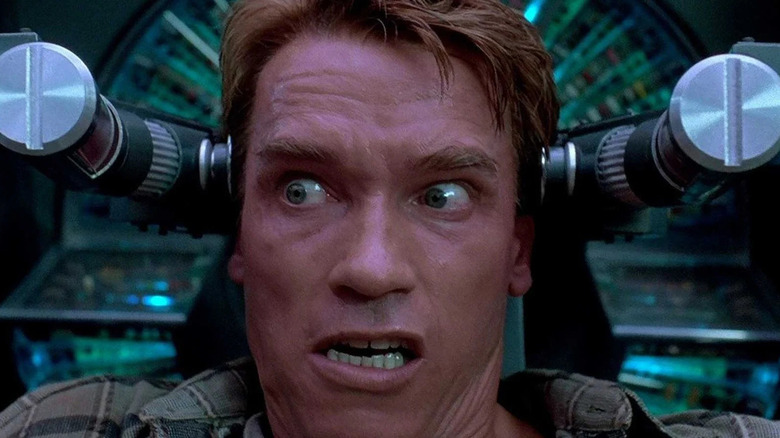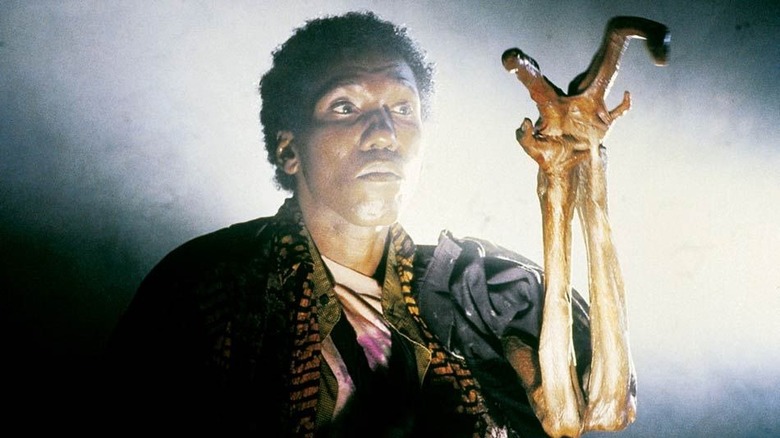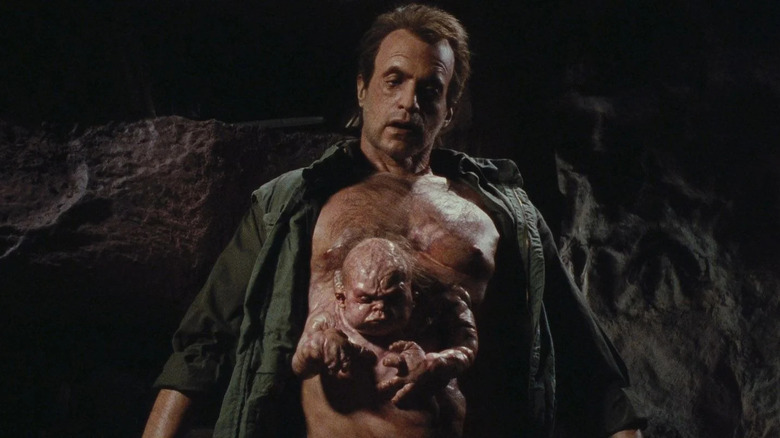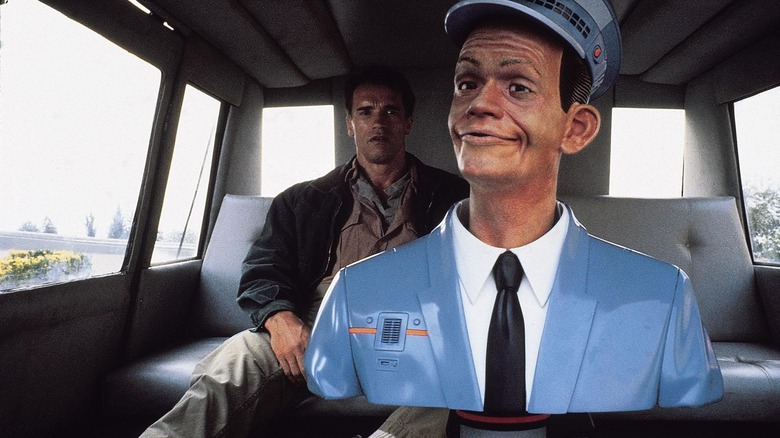David Cronenberg's Darker Take On Total Recall We Never Got To See
Philip K. Dick's 1966 short story "We Can Remember It for You Wholesale" is a clever, brief little sci-fi yarn that plays more like an setup/punchline joke than an actual adventure story. Set in the not-too-distant future, it follows a man named Douglas Quail who goes to a special clinic called Rekal, Inc. that can deliberately implant false memories into the human brain, allowing their customer to remember an elaborate adventure vacation without actually having to go anywhere or experience things firsthand. He asks for an artificial vacation wherein he gets to be a secret assassin who goes on a mission to Mars. When Rekal attempts to implant those memories, however, they discover that Quail actually was a secret assassin who had been on a mission to Mars, and that Quail's wild fantasies are actually suppressed memories from a former life as some sort of dashing government agent. The solution in the story is simple and elegant and I will not spoil the punchline for those who have not read it.
Philip K. Dick is simultaneously impishly clever, breezily erudite, and often deeply pessimistic. Like an anti-Roddenberry, Dick frequently viewed the future as a time of suspicion and fear, when your own memories could not be trusted, and your identity could be manipulated by outside forces. What's more, his stories tended to be very high-concept, featuring alternate timelines ("The Man in the High Castle"), an elaborate crime-predicting system ("Minority Report"), or a society full of in synthetic people ("Blade Runner"), making them tricky for film adaptation.
Striking a strange, perfect balance between Dick's playful sense of humor and his twisty cerebral shenanigans is 1990's "Total Recall," adapted from "We Can Remember It for You Wholesale," and directed by another imp, Paul Verhoeven. And while Verhoeven's adaptation made for an exciting, twisted, very strange, and incredibly violent action spectacular, audiences were nearly treated to a version of the picture by Canada's master director David Cronenberg.
The Cronenberg version
Looking over their respective bodies of work, David Cronenberg and Philip K. Dick are also a good match. Both have a propensity of showing isolated minds devoured by their own dissolution and personal chaos, and both are keen to depict a deep vein of paranoia running through all things. In an interview at the BFI, actor Michael Ironside — who was in "Total Recall," and who worked with David Cronenberg on his 1981 film "Scanners" — noted the difference between Cronenberg and Verhoeven's viewpoints. Verhoeven, he noticed, was a sociopolitical filmmaker who often found a political angle to his material, whereas Cronenberg tends to find his viewpoints from a more personal, individualistic angle:
"[Cronenberg] has a way to work that's more cerebral. I'll get slapped for this one by everybody, by the director as well, but I think Paul has a tendency to take a more socio-political position on storytelling, take an overview of things. Where David, if you look back over his career, I think really takes on a kind of interior [storytelling]; social paranoia, social impact on the individual, the individual against the masses."
"Total Recall" is full of paranoia as it is, as the lead character — renamed Douglas Quaid, played by Arnold Schwarzenegger — is never 100% sure if what he's experiencing is the real world, or merely an elaborate fantasy implanted by Rekall (renamed with an extra "L"). But a large part of Verhoeven's film is the oppression of the Martian people by a militant government presence, and the pervasiveness of violence in a politically charged world. The presence of action star Schwarzenegger underlines this, and the Douglas Quaid of the movie is a far cry from the bookish, introverted Douglas Quail from the original short story.
Cronenberg's early version — in production years before the final film was made — was to star William Hurt as an emotionally wrecked and more pathetic figure whose desires to escape his humdrum life only lead to a pit of dark conspiracy and an even deeper paranoia about his own identity; it wasn't going to be a fun action romp. Cronenberg worked on the script for "Total Recall" for a year, carefully removing the humor, and adding his own trademark steely isolation.
Sewer-dwelling mutant camels
Elements of Cronenberg's original work remain in the finished feature, however. Cronenberg introduced the idea of a rebellion of Martian mutants into the script, and invented the character that would become Kuato, a psychic conjoined twin who lives on another character's abdomen. Cronenberg also authored a more elaborate psychic dream sequence between Kuato and Quaid which would have involved Kuato becoming a sphynx, and then a glowing vagina — Cronenberg's films sometimes contain genital imagery. The idea that Mars was the home of mutants was Cronenberg's most notable contribution Verhoeven's version. Co-Screenwriter Ronald Shusett, in early drafts, had invented alien beasts of burden called Ganzibulls, that were essentially outsize, gasmask-wearing camels. Cronenberg transposed the Ganzibulls to the sewers, making them stranger, subterranean creatures.
Cronenberg's concept for the look of Mars was also drastically different. The dark pyramid in Verhoeven's film was originally meant to be a Martian sphynx — the one Kuato was to morph into — and the Martian landscape was meant to look more elegantly architectural; Verhoeven's Martian sets were more industrial, featuring metal paneling and factory-like walkways. Several pieces of concept art, envisioned by artists Ron and Judith Miller, were released to the public for the first time shortly before the easily-forgotten 2012 remake of "Total Recall," and the art is more evocative of David Lynch's "Dune" than of the finished "Total Recall" we got.
Maybe it was all a dream
Cronenberg ended up leaving "Total Recall" when the studio recast William Hurt with Richard Dreyfuss, wanting a star who was more lively than laconic; both Dreyfuss and Hurt are excellent actors, but they certainly have different strengths. Cronenberg realized that what the studio wanted was far too different than what he was willing to provide, and he moved onto bigger and better things; In 1988, Cronenberg made the celebrated "Dead Ringers," and in 1991, he and William Hurt would end up making the heady and surreal "Naked Lunch," an adaptation of the drug-fueled, stream-of-consciousness novel by William S. Burroughs.
Meanwhile, "Total Recall" would evolve quite a bit during its years of development. Australian director Bruce Beresford ("Tender Mercies," "Driving Miss Daisy") was brought on at one point, with Patrick Swayze set to star, ensuring that "Total Recall" was going to be more action-oriented. Eventually, that version, with elements of Cronenberg mixed in, evolved into the Verhoeven/Schwarzenegger version that was released.
The 1990 version of "Total Recall" is, to editorialize, an excellent film, featuring a fun, violent, nightmare carnival tone that communicated a good deal of playful cynicism, a tone that would become the hallmark of a lot of entertainment in the 1990s. Also, Verhoeven was not shy about extreme gun violence, and the flying bullets, bizarre nasal invasion probes, and arm-severing elevators made for some well-noted cinematic action iconography. The finished product was certainly different from Cronenberg's vision, and Cronenberg would likely have made a great film, but Verhoeven's film did end up striking the right sort of alchemy for a great action picture.



